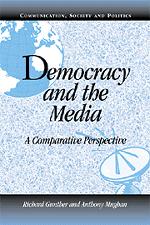Book contents
- Frontmatter
- Contents
- List of Contributors
- Acknowledgments
- 1 The Media in Democratic and Nondemocratic Regimes: A Multilevel Perspective
- 2 The Media and Politics in Spain: From Dictatorship to Democracy
- 3 Institutional Incapacity, the Attentive Public, and Media Pluralism in Russia
- 4 Democratic Transformation and the Mass Media in Hungary: From Stalinism to Democratic Consolidation
- 5 The Modernization of Communications: The Media in the Transition to Democracy in Chile
- 6 Media Influence in the Italian Transition from a Consensual to a Majoritarian Democracy
- 7 The United States: News in a Free-Market Society
- 8 Japan: News and Politics in a Media-Saturated Democracy
- 9 The Netherlands: Media and Politics between Segmented Pluralism and Market Forces
- 10 Great Britain: The End of News at Ten and the Changing News Environment
- 11 Germany: A Society and a Media System in Transition
- 12 The Political Impact of the Media: A Reassessment
- References
- Index
3 - Institutional Incapacity, the Attentive Public, and Media Pluralism in Russia
Published online by Cambridge University Press: 05 June 2012
- Frontmatter
- Contents
- List of Contributors
- Acknowledgments
- 1 The Media in Democratic and Nondemocratic Regimes: A Multilevel Perspective
- 2 The Media and Politics in Spain: From Dictatorship to Democracy
- 3 Institutional Incapacity, the Attentive Public, and Media Pluralism in Russia
- 4 Democratic Transformation and the Mass Media in Hungary: From Stalinism to Democratic Consolidation
- 5 The Modernization of Communications: The Media in the Transition to Democracy in Chile
- 6 Media Influence in the Italian Transition from a Consensual to a Majoritarian Democracy
- 7 The United States: News in a Free-Market Society
- 8 Japan: News and Politics in a Media-Saturated Democracy
- 9 The Netherlands: Media and Politics between Segmented Pluralism and Market Forces
- 10 Great Britain: The End of News at Ten and the Changing News Environment
- 11 Germany: A Society and a Media System in Transition
- 12 The Political Impact of the Media: A Reassessment
- References
- Index
Summary
The Russian mass media, and particularly television, have been associated in recent years with changes that have a profound significance for democracy. Post-Soviet Russia is a huge, complex, turbulent country where mass media, penetrating the farthest reaches of a vast territory spanning 11 time zones, abruptly shifted from one structural design to another in the space of only a few years. The changes wrought over this period tell us much about the interaction between media systems and political change. The reforms introduced by the last leader of the Soviet Union, Mikhail Gorbachev, resulted in reduced regulation and ultimately the erosion and implosion of institutions of power. Space was thereby made for the birth of pluralism. In post-Soviet Russia, problems attendant on the development of new institutions to buffer editorial autonomy from political and commercial power have produced a peculiar paradox: the most impartial and comprehensive public-interest programming comes from commercial media organizations.
Market pressures made the establishment of a brand imperative in an increasingly competitive media sector, and the legitimacy of commercial structures as purveyors of news had to be built up and consistency displayed. Thus, to enter the news business credibly, a commercial news organization had to be perceived as bringing a new set of values and techniques to the Russian public. NTV, the largest commercial network in post-Soviet Russia, achieved this branding during the first war in Chechnya. Competition led the new commercial network to differentiate itself in terms of sophistication, balance, accuracy, and production values.
- Type
- Chapter
- Information
- Democracy and the MediaA Comparative Perspective, pp. 85 - 121Publisher: Cambridge University PressPrint publication year: 2000
- 9
- Cited by



